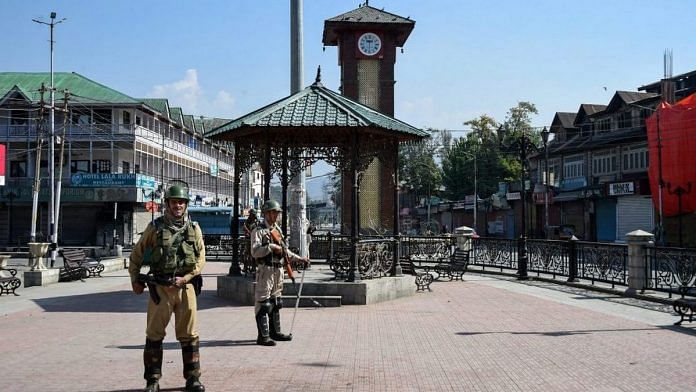Nobody in Delhi deemed it worthwhile to take a step back and see if Kashmir was in favour of elections at this juncture.
Since 1989, the first time I was old enough to understand the importance of elections in a democracy, elections in Jammu and Kashmir have intrigued me.
I belong to the ‘J’ part of the state – Jammu – and it was fascinating to see the long queues outside polling stations in the Jammu region even as large-scale disenchantment with the political class became somewhat of a national phenomenon and kept growing roots.
But, it was the Kashmir region and its hide-and-seek with elections, which was the subject of discussion in our drawing rooms. “Iss baar Kashmiri vote karenge? Darr hai, militants ne maar dene ki dhamki di hai. Zyaada nahin hoga (Will Kashmiris come out to vote this time? There is fear, militants have issued death threats to those coming out to vote. Not too many will vote),” used to be the common refrain.
In most cases, the eventual turnout would be much better than expected. The 2014 Jammu and Kashmir assembly election saw the highest polling percentage in 25 years – almost 66 per cent. Much of this turnout was due to the high expectations that voters in the militancy-hit state had from Narendra Modi, the man who had just been sworn in as the Prime Minister.
Although Modi’s BJP and Mufti Mohammad Sayeed-led Peoples Democratic Party (PDP) contested separately, the fractured mandate forced them to come together to form the government. Both sides said the alliance was truly representative of the two very distinct regions of the state – unfortunately, nobody even talks about the third region, Leh-Kargil.
But, it was all downhill from there on.
Also read: 7 Kashmir special police officers resign amid Hizbul threats, govt says it’s propaganda
The contradictions in the alliance started showing up in the lack of governance. The electorate, which had braved threats by militants and their sympathisers in the Hurriyat to affirm their faith in democracy, soon lost faith in the elected leaders. And, Mufti’s untimely death only made things worse.
The new government, this one under Mufti’s daughter – Mehbooba Mufti – continued to drift, and voters began to ask what happened to the mega promise of change and good governance.
It didn’t help that the Centre also showed no imagination in dealing with the situation. In fact, the slide can be attributed to the foolhardy and ham-handed actions of the Modi government.
Fast-forward to the present
Militancy was making a gruesome comeback, especially with highly educated local youths joining the ranks. This became apparent to all, except the security czars and policymakers sitting in Delhi.
Also read: PhD scholar-turned-Hizbul militant Mannan Wani killed in Kashmir encounter
With Mehbooba government also gone and appointment of Satya Pal Malik as governor of the state, many expected the Centre to take steps to woo the disenchanted people back. But all that the Centre decided was to hold elections to the local and panchayat bodies. Nobody deemed it worthwhile to take a step back and see if that was what the people wanted. Everyone in Delhi seemed to hold the opinion that the elections by themselves were an answer to all the questions.
While Jammu, as expected, came out in large numbers to vote, most of Kashmir decided to stay away from the polling booths. It didn’t help that the National Conference and the PDP announced a boycott of the elections. Was any attempt even made to bring them around so as to ensure the participation of the two main political groups that enjoy some base in the Valley?
Whatever be the reasons, it wouldn’t be wrong to say that holding elections at this juncture, without first building bridges with the people, was a bad idea. It wasn’t thought through well.
Just about two per cent polling in Srinagar (city) didn’t make for a pretty picture, did it?
Also, did anyone actually think the BJP had the political muscle in Kashmir to win 60 municipal seats? But it did achieve the feat only because it won those seats unopposed. Did anybody other than this writer see the sham in these “wins”? And, what about the seats where even the BJP could not field a candidate?
Also read: BJP wins 60 seats in Kashmir: Opposition boycott undermining democracy or letting BJP grow?
To add to the lack of seriousness, the Governor told NDTV that a foreign-educated person – some say he was referring to former National Conference spokesperson Junaid Azim Mattu, who contested as an Independent – would be the next Mayor of Srinagar. The Raj Bhawan tried to play down the remarks later, but nobody was buying it.
Unless something big and constructive happens, these elections aren’t going to make Kashmiris forget the outstanding problems, most of them birthed by bad politics and an unpardonable disconnect with the ground reality.




Kashmir and Pakistan, deeply intertwined, are two of our most intractable problems. Creative, imaginative solutions have proved elusive for seventy years. Whatever else was missing, high quality intelligence was available aplenty. Not a chinaar leaf flutters to the ground in the Valley without Delhi being aware of it in real time. So one wonders sometimes why this is not being converted into worthwhile outcomes. 2. The failure of the PDP – BJP coalition experiment must count as one of the greatest missed opportunities of this administration. With statesmanship and generosity of spirit, it could have worked wonderfully well, led to a much better relationship with Pakistan as well.